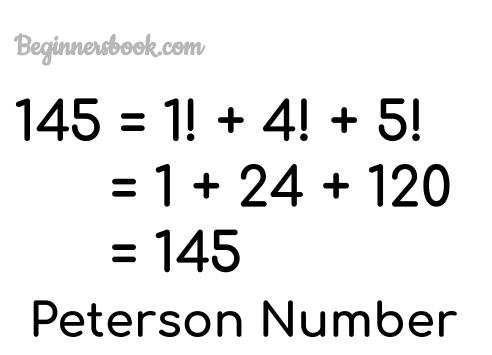In this tutorial we will write a java program to check whether a given number is Peterson number or not. A number is called Peterson if the sum of factorials of each digit is equal to the number itself.

As shown in the above image, number 145 is Peterson number as the sum of factorials of each digit of this number is equal to the number itself.
Let’s take another example, number 555 is not a Peterson number as the sum of factorials of each digit is 360 which is not equal to the 555.
5! + 5! + 5! = 120 + 120 + 120
= 360
Program to check for Peterson number
In this example we are taking input from the user. User enters the number and then this program checks whether the input number is Peterson or not.
The logic we have used here is pretty simple, we already know that the single digit of any number ranges from 0 to 9 so we have stored the factorial of these numbers in an array. This way we can quickly finds the factorial of a digit by referring to this array. For example value of factorial[4] contains the factorial of 4.
The entered number is passed to a user-defined function isPeterson that we have created to check the number.
Inside the while loop, we are finding the factorial of last digit of the number at each iteration and at the end of the iteration we are removing that digit from the number so in the next iteration, we find the factorial of second last digit. This goes on and on until the factorials of all digits are found and added together in the variable sum.
At last the function compares the sum of factorials to the number itself and returns true or false.
import java.util.Scanner;
public class JavaExample
{
/* This array is to determine the factorial of single digit quickly
* (factorials of 0 to 9 stored)
*/
static long[] factorial = new long[] { 1, 1, 2, 6, 24, 120, 720, 5040, 40320, 362880};
public static void main(String args[])
{
Scanner scan = new Scanner(System.in);
System.out.print("Enter the number: ");
//storing the input number in the variable num
int num = scan.nextInt();
/* now we are calling our user-defined function to check whether
* the input number is Peterson or not
*/
if (isPeterson(num))
System.out.println(num + " is a Peterson number.");
else
System.out.println(num + " is not a Peterson number.");
}
//user-defined function where we have written the logic to check
static boolean isPeterson(int n)
{
int num = n;
int sum = 0;
//looping the number until we find the factorial of each digit
while (n > 0)
{
//we get the last digit of the number
int lastDigit = n % 10;
/* Since we have already stored the factorial of each digit
* in the array factorial, we are pulling the factorial quickly
* from the array itself by passing the digit
*/
sum += factorial[lastDigit];
/* Since we have stored the factorial of last digit in the
* variable sum, lets remove this digit from the number to find
* the factorial of second last digit in the second iteration of loop.
*/
n = n / 10;
}
/* We are comparing the sum of factorials of all digits to the
* number and returning boolean value true or false.
*/
return (sum == num);
}
}
Output 1: When user entered the number 145
Enter the number: 145 145 is a Peterson number.
Output 2: When user entered the number 456
Enter the number: 456 456 is not a Peterson number.
To learn Java from scratch refer: Java tutorial for complete beginners.
Leave a Reply